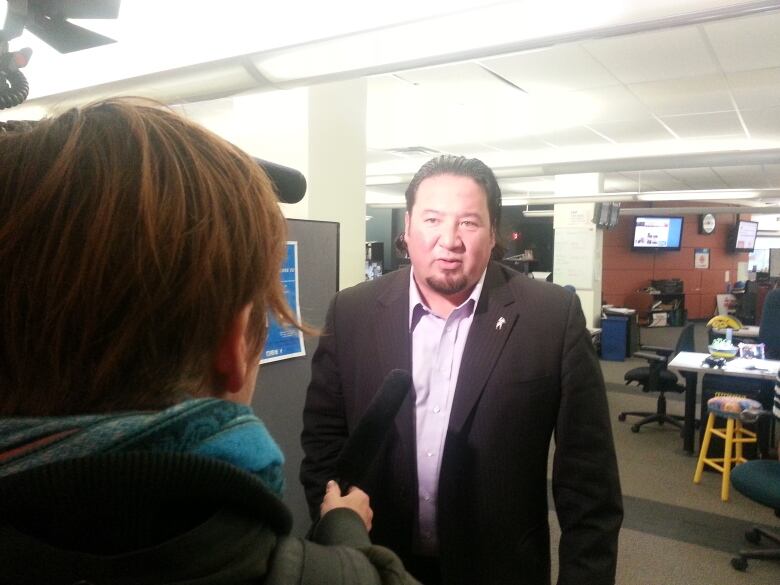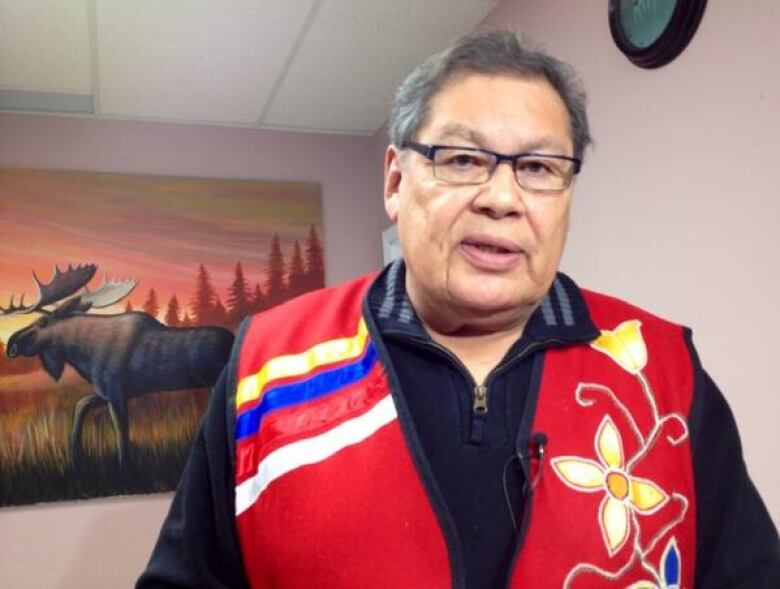Manitoba First Nation leaders hope UN report will prompt action
'We're being treated poorly here and we need to do something about it,' says AMC grand chief
First Nation leaders in Manitoba say they are hopeful a United Nations envoy's report, whichsays more effort is needed in Canada's relations with aboriginal people, will prompt action.
"What does this government need in order to wake up? We also have to get to the opposition; we have to get to the Liberals,we have to get to theNDPand indeed we have to get to the Canadian public," ChiefJim Bear of theBrokenheadOjibwayNationsaid Monday.
The report by JamesAnaya, UN special rapporteur on indigenous rights,said Canada has made notable efforts to improve the social and economic well-being of aboriginal people, but more work is needed.
- Canada's aboriginal well-being efforts 'insufficient,' UN envoy says
- UN report on Canadas treatment of aboriginal people in spotlight Monday
Grand Chief DerekNepinakof the Assembly of Manitoba Chiefs said he is happy the report is getting international attention, but said he has some reservations about whether it will translate into action.
"The report is good in so far that it identifies a broad scope of issues, but you've got to dig a lot deeper to see the consequences of some of the legislation," he said.

"We're beingtreated poorly here and we need to do something about it, saidNepinak. "They package up big numbers in the billions of dollars and talk about how much investment they've made and so forth. There's low-hanging fruit for them to hang their hat on."
University of Winnipeg instructor Leah Gazan said the federal governments failure to adequately consult with First Nations is laid bare in the report.
One of the things I noticed from the report is [Anayas] focus on the declining relationship between First Nations and the government of Canada since 2003, when the last report came out which is disappointing but not surprising.
Gazan, who is involved in with the local Idle No More movement, said the report alerts Canadians to the international importance of ongoing problems facingFirst Nations.
It certainly brings to light some of the issues. I hope the federal government will take it seriously, but if anything I think it lets other Canadians know how severe the human rights infractions are against indigenous people in Canada and hopefully will join as allies in making sure all Canadians enjoy fundamentalhuman rights," she said.
Extent of missing, murdered women a 'genocide'
Nepinakcommented on areport released earlier this monthby the RCMP detailing the extent of Canadas missing and murdered aboriginal women, calling the mass disappearancea "genocide."
"Identifying some of the key areas where there are significant problemsand of course the ongoing call for a national public inquiry into missing and murdered indigenouswomen of course is akey," he said.

The federal government acknowledgedthat more needs to be done, but said advances are being made.
The report acknowledges that, while many challenges remain, the government has taken many positive steps to improve the overall well-being and prosperity of aboriginal people in Canada," said Bernard Valcourt, minister of aboriginal affairs and northern development, in a written statement. "We will review the report carefully."
Valcourtsaid the federal government is committed to developing a "fair and lasting resolution to the legacy of the Indian Residential Schools," citing the prime minister's 2009 apology to First Nations and the release of over fourmillion documents to the Truth and Reconciliation Commission as examples.
Rapporteur critical of feds
But Anayacriticizedthe federal and provincial governments, sayingattempts to address First Nation andMtisissues have beeninsufficient.
In an advance unedited version of the report released on May 7,Anayawrotethat treaty claims "remain persistently unresolved,indigenous women and girls remain vulnerable to abuse, and overall there appear to be high levels of distrust among indigenous peoples toward government at both the federal and provincial levels."
Anaya's report also touches onthe state of government relations to Canadas Mtis population.
It bears mentioning that, in spite of recent judicial affirmation that the Mtis had not been provided the lands they were owed under the letter and spirit of the constitutionalagreement that created Manitoba, the government does not appear to have a coherent process or policy in place to address the land and compensation claims of the Mtis people.
Anaya spent nine days visiting aboriginal communities across Canada, as well as meeting with government representatives, to take stock of the plight of aboriginal people in the country.













_(720p).jpg)


 OFFICIAL HD MUSIC VIDEO.jpg)
.jpg)



























































































